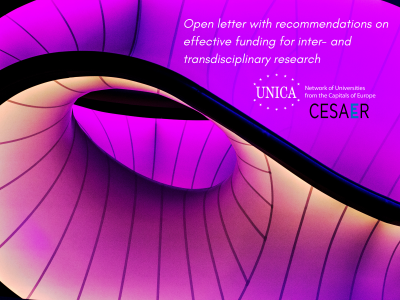UNICA & CESAER Open letter with recommendations on effective funding for inter- and transdisciplinary research
02 December 2020 | From UNICA

CESAER and UNICA have published a joint open letter to the European Commission and Science Europe, outlining our recommendations on how to advance funding for inter- and transdisciplinary research under competitive national and European funding instruments in the years ahead.
CESAER – the strong and united voice of universities of science and technology in Europe – and UNICA – the institutional Network of Universities from the Capitals of Europe – point out that the major challenges we face today – whether they are cultural, ecological, economic, health-related, social or societal – are so complex and overarching that inter- and transdisciplinary research collaboration is needed to assess, understand and solve them. We stress the need to incentivise researchers to collaborate beyond their disciplines, create more opportunities for such interactions and boost funding opportunities for inter- and transdisciplinary research.
With this open letter, we:
- Flag the challenges of our member universities when seeking funding for inter- and transdisciplinary research;
- Highlight how universities and researchers can stimulate inter- and transdisciplinary collaborations;
- Provide concrete recommendations for research funding organisations and agencies in general, and the Directorate-General for Research & Innovation of the European Commission in particular, to improve their policies and funding instruments;
- Offer our considerations on how to review the evaluation of proposals and corresponding guidelines to evaluators.
Rik Van de Walle, President of CESAER and Rector of Ghent University, said: “We aim to position our member universities at the forefront of efforts to address the global challenges and to offer innovative and sustainable solutions. The success of this endeavour is underpinned by our ability to effectively link the Social Sciences and Humanities (SSH) with Science, Technology, Engineering and Mathematics (STEM) and adapt the funding schemes accordingly. By putting forward our recommendations, we offer our insights and invite our partners for a dialogue at the highest level to truly advance our mutual understanding of the magnitude of the measures needed“.
Luciano Saso, President of UNICA and Vice-Rector of Sapienza University of Rome, said: “We strongly believe that an inter- and transdisciplinary approach, a common feature of research until the nineteenth century, is highly interesting and creative and can often lead to revolutionary breakthroughs. The enormous impact of fundamental physics on the development of new therapeutic and diagnostic medical tools, as well as GPS mapping in archaeology, or modern investigations on Renaissance paintings and Egyptian mummies are widely known examples. Today, researchers live in a digital and highly interconnected society, and they are ready to face complex inter-disciplinary research challenges, however more and better financial tools are needed to make their efforts more effective“.
Please reference this document using: https://doi.org/10.5281/zenodo.4290236
For more information and enquiries, please contact Secretary General of CESAER David Bohmert and President of UNICA Luciano Saso.


 Co-funded by the European Union. Views and opinions expressed are however those of the authors only and do not necessarily reflect those of the European Union or the European Education and Culture Executive Agency (EACEA). Neither the European Union nor the granting authority can be held responsible for them.
Co-funded by the European Union. Views and opinions expressed are however those of the authors only and do not necessarily reflect those of the European Union or the European Education and Culture Executive Agency (EACEA). Neither the European Union nor the granting authority can be held responsible for them.